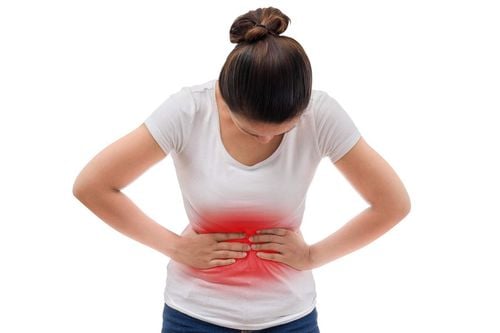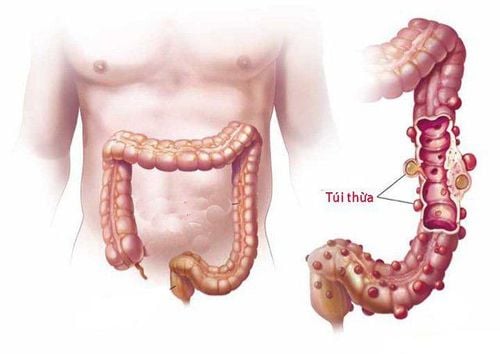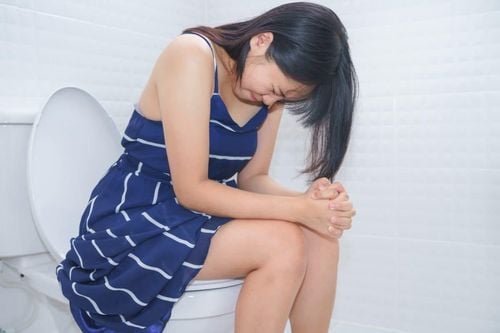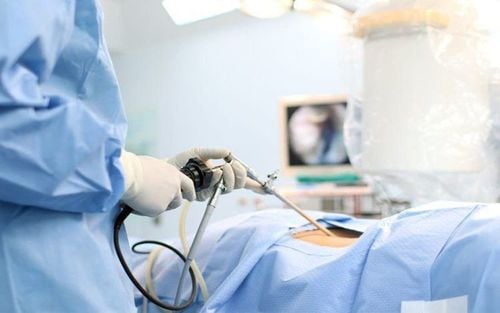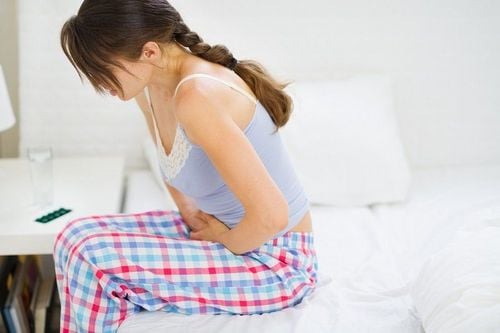This is an automatically translated article.
One of the most common problems experienced by many mothers is rectal bleeding after childbirth, which causes pain and discomfort that greatly affects the patient's quality of life. So how to treat and limit the symptoms of postpartum rectal bleeding?1. Why do I have rectal bleeding after giving birth?
Rectal bleeding that occurs during pregnancy or after giving birth is usually due to hemorrhoids that cause varicose veins in and around the rectum.Hemorrhoids are relatively common during pregnancy, especially during the third trimester and in the weeks following delivery. If you strain too much when you have a bowel movement or if you have difficulty passing stools due to constipation, the veins in the rectum can swell, which can lead to bleeding.
Difficult bowel movements due to constipation can also cause cracks in the skin of the anus. This is called an anal fissure and can be quite painful, especially during and right after a bowel movement. While these are the most likely causes during pregnancy and after you give birth to rectal bleeding, certain gastrointestinal diseases can also lead to rectal bleeding.
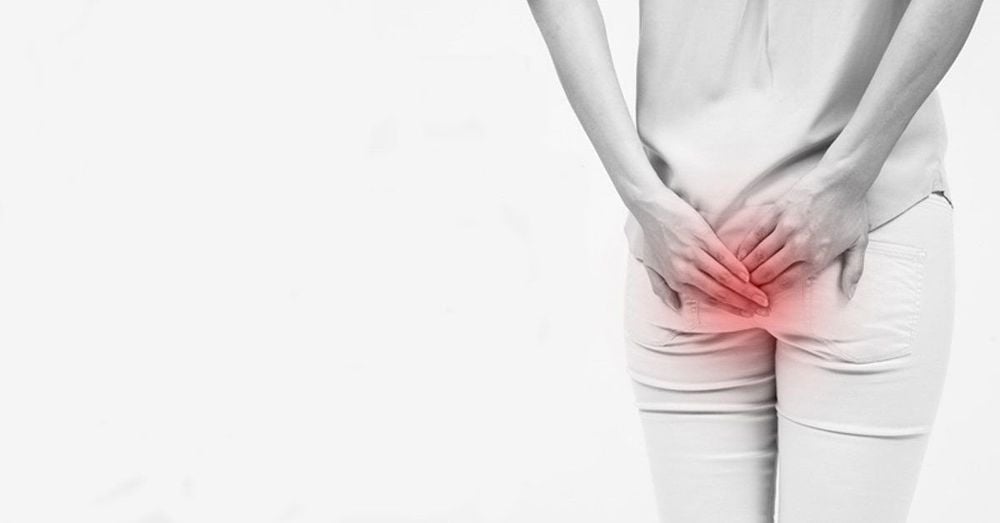
Một trong những vấn đề phổ biến nhất mà nhiều bà mẹ gặp phải là chảy máu trực tràng sau sinh
2. What can I do to stop postpartum rectal bleeding?
It's not uncommon for your bowel movements to be slow or light in the days after you give birth. Because hemorrhoids and anal fissures often cause rectal bleeding after delivery and are irritated by constipation. Here are some tips to help you prevent rectal bleeding and ease constipation:Eat foods rich in fiber like cereals, whole grain breads, beans, fresh fruits and vegetables every day. . If this doesn't work for you, try adding a few tablespoons of unprocessed wheat bran to your morning cereal. You can start with a smaller amount of bran and gradually increase the amount to avoid too much gas in the stomach. After eating, remember to drink a large glass of water. Drink a lot of water. A glass of fruit juice a day, especially prune juice, can also help with constipation. Besides, regular exercise such as walking, swimming, and regular yoga can help relieve constipation and help you feel healthier. Ask your doctor about over-the-counter fiber supplements, such as stool softeners or mild laxatives. Sit Correctly: Sitting on a pillow or soft cushion helps to remove pressure on the rectum. Likewise, sitting in a rocking chair or recliner is more comfortable than sitting in an upright chair. Reduce activities that put pressure on the rectum: Pressure in the rectal area is the main culprit for hemorrhoids. Therefore, there is a need to reduce factors that contribute to rectal pressure. Certain daily activities or medical conditions increase rectal pressure and you need to limit activities when there is a risk of hemorrhoids or aggravation of existing hemorrhoids, thereby preventing rectal bleeding after delivery: Fat; Constipation; Lifting heavy objects; Sitting on the toilet for too long; Push hard and long to get a bowel movement. Witch hazel extract: Witch hazel is a popular herb, widely used to treat hemorrhoids. Witch hazel extract has antiseptic properties. This works to reduce pain, itching, and irritation associated with hemorrhoids. In addition to its antiseptic properties, witch hazel extract is also an astringent. Thus, it makes the hemorrhoid shrink and effectively stops bleeding. Use an over-the-counter hemorrhoid cream: Using an over-the-counter hemorrhoid cream, which can be in the form of an ointment, suppository, or spray, works to relieve itching and discomfort for a while. short. However, you should consult your doctor before inserting any items into the rectal area, especially if you have had an episiotomy or anal fissure. Using any medication by mouth, topically or sprayed, including suppositories, into the rectum or anal area without the advice of a doctor can cause unwanted effects.
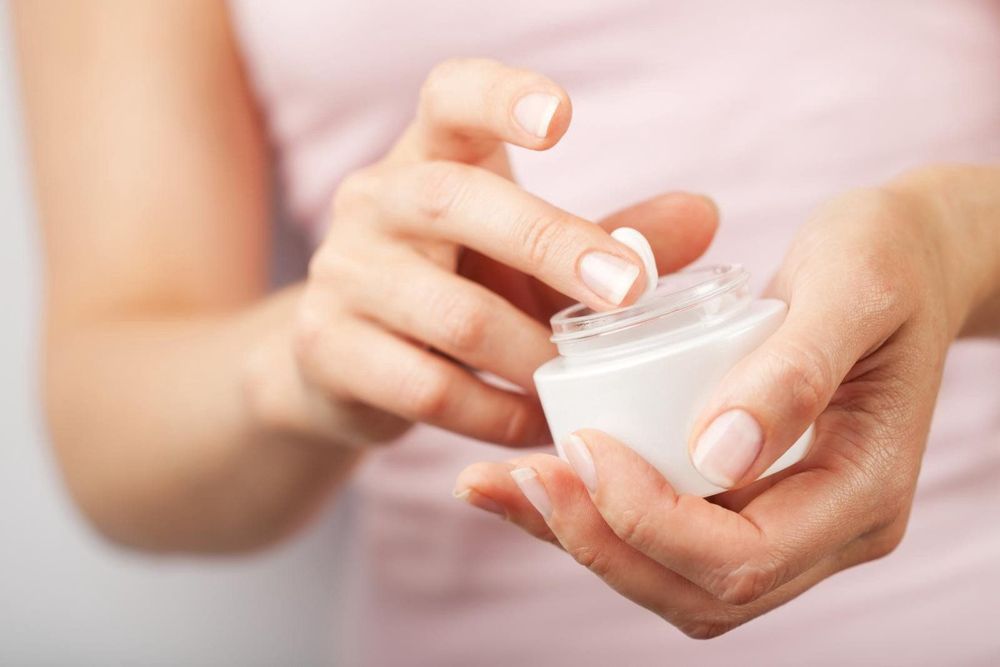
Sử dụng một loại kem để điều trị bệnh trĩ không cần kê đơn có tác dụng giảm ngứa và khó chịu trong thời gian ngắn
3. What can I do to relieve the pain?
Here are some suggestions to help you deal with hemorrhoids and anal fissures:Take a "sitz bath" several times a day by soaking in warm water for about 10 to 15 minutes. You can use a small basin or you can simply fill the tub with warm water so that the height of the water is only a few inches of warm water. Note, you do not add any soaps or fragrances. Relaxing anal muscles during a warm soak will help maximize blood flow and heal damaged areas of the anus. Learning to relax these muscles can also make bowel movements less painful.
To identify these muscle groups, simply contract the same muscles you use to stop urinating or defecation and then relax these muscles, just like when you do Kegel exercises. You should do this exercise a few times while you are taking a sitz bath.
Do Kegel exercises when you're not in the tub, to help strengthen and tone the muscles around your vagina and urethra, which will help you recover faster after giving birth. For hemorrhoids, some women find comfort in placing an ice pack or cool water on the anal area. Try alternating hot and cold treatments: Start with an ice pack and then a sitz bath with warm water. Using soft, white, unscented toilet paper towels is less likely to cause irritation than colored or scented products. Or use a baby wipe or a damp washcloth soaked in an astringent solution of witch hazel. Ask your doctor about a safe topical anesthetic or rectal suppository. There are many such products on the market, but most should only be used for a short course of treatment (a week or less). Continued use may cause more inflammation. For temporary pain relief, you can take acetaminophen or ibuprofen, even if you're breastfeeding. However, do not use aspirin or aspirin-containing products if you are breastfeeding. Do not take more than recommended or indicated and if pain persists, talk to your midwife or doctor. Keep in mind that opioid medications such as Percocet and Vicodin may be prescribed after delivery and that they can cause constipation as a side effect, so avoid taking them for the first few days after giving birth. .
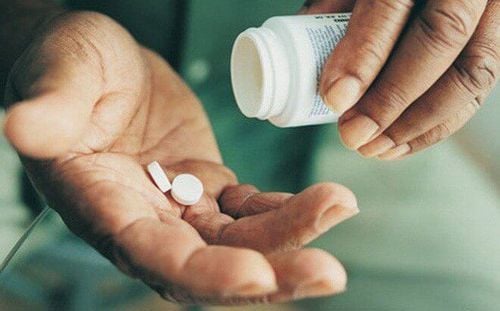
Để giảm đau tạm thời, bạn có thể dùng acetaminophen hoặc ibuprofen
4. What are dangerous signs of postpartum rectal bleeding?
Danger signs of postpartum rectal bleeding are rare, but by no means impossible, so be sure when you notice any danger or unusual signs you should go to the facility. Medical as soon as possible.Bleeding from hemorrhoids usually stops on its own, especially if you make lifestyle changes to prevent constipation. However, in severe cases, you may be referred to a specialist for treatment, which may include minor surgery. Likewise, if you have an anal fissure that won't heal, your midwife or doctor may refer you to another specialist for help.
There are now many methods to treat anal fissures and postpartum hemorrhoids. Accordingly, the choice of method depends on the clinical examination and evaluation, the patient's choice is also a consideration factor before specifying the surgical method. The classic method of hemorrhoidectomy (Milligan Morgan, Ferguson, White Head) is indicated for cases of mixed hemorrhoids, hemorrhoids with embolism, internal prolapsed hemorrhoids with strangulation complications. In cases of simple internal hemorrhoids, grade III, IV, Longo surgery with the advantages of less postoperative pain, no open scar in the anal area after surgery, short hospital stay, few complications of anal stenosis, recovery time Fast is often the patient's choice.
When you go home, to make the treatment more effective, you should regularly soak your anus with warm salt water for about 15 minutes a day, wash it with clean water after each bowel movement, you should eat a lot of green vegetables. , fresh fruit and pay attention to drink enough water per day at least 1.5 liters of water; minimize the consumption of hot spicy foods or stimulants; should rub the abdomen every time you have a bowel movement; exercise regularly every day. At the same time, women should avoid doing heavy work or standing or sitting for too long ...
Postpartum rectal bleeding is not difficult to detect, because its signs are easy to recognize. When detecting the disease, please go to the most secure medical facility for examination and help the treatment to be effective in the best way.
Please dial HOTLINE for more information or register for an appointment HERE. Download MyVinmec app to make appointments faster and to manage your bookings easily.
Reference source: babycenter.comSEE MORE:
Postpartum constipation - How is it treated? Causes and treatment of postpartum hemorrhoids Anal fissures after giving birth: The suffering of mothers




